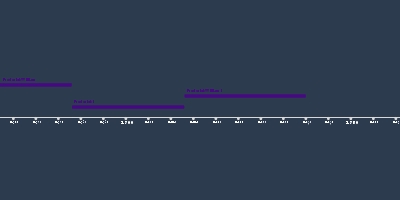German Unification (1 янв 1866 г. – 1 янв 1871 г.)
Описание:
Tensions grew between Austria and Prussia after Austria blocked Wilhelm IV’s attempt to unify Germany. Economic differences worsened tensions; Austria was the only German state not included in the Zollverein/German Customs Union, which stimulated trade and increased state revenues.Prussia left 1848 with a weak parliament and a longing for national unification. Prussian leader Wilhelm I thought great political change and war were possible. His attempts to raise taxes and the defense budget were blocked by parliament, causing a political stalemate. He then appointed Count Otto von Bismark and encouraged him to defy parliament.
Bismarck was a master of Realpolitik, political practice based on a careful calculation of real-world conditions rather than ethical ideas or ideological assumptions. He was born into the landowning aristocracy and had a strong personality and an unbounded desire for power yet kept his options open. To the dismay of a large liberal opposition, he continued to collect taxes and reorganize the army.
Previously, the Danish king had tried to take Schleswig-Holstein-two disputed provinces. Prussia and Austria then won a short war against them. Bismarck was convinced that Prussia must control the north, which meant forcing out Austria. Fearful of Austria’s allies response, he persuaded them to remain neutral with territorial promises of reminders of past support.
The following Austro-Prussian War of 1866 lasted seven weeks. Prussia gained a swift victory at the Battle of Sadowa due to its repeating rifles and advanced railroads. Prussia treated Austria with leniency. Austria paid no reparations and lost no territory to Prussia, while Prussia gained several small states and the remaining principalities in the newly formed North German Confederation.
Bismarck then sought to make peace with nationalists and the liberal middle class. He made a federal constitution for the new North German Confederation, that retained local governments but made an imperial chancellor, Bismarck, who was only responsible to the king, Wilhelm I, who was the president of the confederation. The federal bureaucracy controlled the army and foreign affairs. A weak federal legislature gave some voice to public opinion. Bismarck made peace with parliamentary opposition. The constitutional struggle in Prussia ended, and unity was in sight.
Bismarck then went to war with France to gain the south German states in the Franco-Prussian war. He manipulated a minor diplomatic issue to make France declare war. He immediately enlisted the support of the southern states, and his previous generosity to other nations ensured their neutrality. Combined German forces defeated France. Louis Napoleon was captured and humiliated. Patriots continued to fight until a besieged and starving Paris surrendered. The southern states joined the new German Empire and Wilhelm I was proclaimed emperor of Germany. France was required to give up 5 billion francs, Alsace, and part of Lorraine, a harsh penalty that poisoned relations. The war marked a triumph of semi-authoritarian nationalism and a new conservatism. Patriotism surged as Germany had become the most powerful European nation in less than a decade.
Добавлено на ленту времени:
Дата:
1 янв 1866 г.
1 янв 1871 г.
~ 5 years
